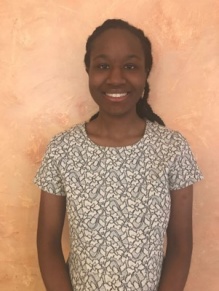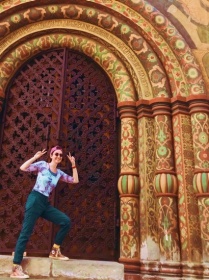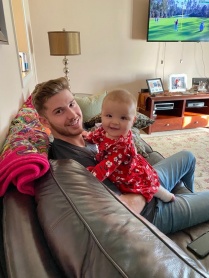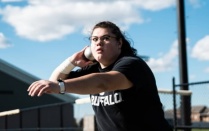
Undergraduate News
Meet the New Director of Undergraduate Studies, Andreas Daum

Andreas Daum in front of the volcanic mountain Pico del Teide on the Spanish island of Tenerife off the coast of Northwest Africa.
Introducing myself as the Department of History’s new director of undergraduate studies somewhat means coming full circle. A long time ago (I won’t tell you how long,) I began academic teaching as an instructor for undergraduate students from the U.S. who studied in a junior year program in Munich, Germany.
Meeting young students who are curious to explore other cultures and embark on new intellectual journeys has been one of the most rewarding experiences of my professional life. As a historian working on modern Europe, transatlantic relations and science in public culture, I’ve learned a lot from the ever-changing, youngest cohorts of students. After a recent Zoom presentation on one of my research projects, a biography of the naturalist Alexander von Humboldt, it was the group of undergraduates in the audience that challenged me the most.
Why is studying history as an undergraduate at UB a worthwhile and, yes, exciting endeavor-both for students and faculty? Three things come immediately to my mind.
First, we offer a robust, balanced and diverse program with stimulating courses from the 100 to the 400 level. Our 100-level surveys and World History classes allow undergraduates to meet students from other UB schools and lay the foundation for what is to come. We continuously adjust our course contents to reflect new scholarship and current questions, including inviting guest speakers dealing with special topics of immediate relevance, for example global pandemics in history. Our HIS 301 class helps students gain essential skills, such as analyzing complex issues, writing well-structured papers, crafting arguments and more. In our 400-level seminars, students have the opportunity to develop their own research projects.
Second, we cherish an inclusive environment and promote creativity. We respond to our students’ cultural interests by offering access points to multiple issues that concern us in the global world we live in. In our courses, students study the history of politics, dictatorships and war, nation-states and empire-building; they explore developments in the field of public medicine, disabilities studies and gender relations; they investigate colonialism, religion and collective mentalities; they tackle the emergence of slavery, racism and urban life - to name only a few examples. We do so with chronological depth and a global outlook; our undergraduates can join classes on US and Latin American History as well as on European, Asian and African history.
Third, the Department of History recognizes the achievements, civic engagement and creative writing of undergraduates. This includes specific awards for students from underrepresented minorities and for undergraduates from our region who need to work part-time to make ends meet. There is also our distinct, departmental Honors Program, which is different from the UB-wide Honors College. It provides students with extra mentorship and activities and leads them to write an honors thesis based on their individually chosen, original research. I am teaching the Honors Seminar myself this fall - it’s fun, it’s a great chance to bring together outstanding students with all kinds of interests and the seminar counts toward the major!
Looking ahead, my colleagues on the undergraduate committee - Carole Emberton (herself a formidable former director of undergraduate studies), Cari Casteel, Sarah Handley-Cousins and Ndubueze Mbah - and I would like to work toward creating and enhancing a culture of early recognition, helping us to identify and promote early on undergraduates who excel academically and contribute in various ways to our program. I hope I can report more in the next newsletter. In the meantime, stay tuned and check our website, Facebook, Twitter and Instagram accounts for updates and announcements.
Most importantly, we encourage our undergraduates to communicate with us individually, be it your instructors in class, me as the director of undergraduate studies (adaum@buffalo.edu) or Shayna Devlin (sdevlin3@buffalo.edu), a historian of Medieval Europe and staff member, who offers advisement and support in Park Hall throughout the week - just come by!
2021 Scholarship Award Winners

CAS Outstanding Senior and 2020-2021 scholarship winner, Mariah Agbonkpolo

Department of History Outstanding Senior: Mia Hanson

Class of 2021 Graduate Achilles Blessios

Class of 2021 Graduate, PAT Member, and Seminar Paper Prize Winner Molly McCreedy
College of Arts and Sciences Outstanding Senior
Mariah Agbonkpolo
Department of History Outstanding Senior
Mia Hanson
Honorable Mentions:
Mariah Agbonkpolo
Tiana Gleason
Molly McCreedy
Undergraduate Diversity Scholarship
Monica Adam
Callie Camodeca-Schmidt
Timothy DeLeon
Zachary Dubel
William Gonzalez
Danielle Redfield
Joyce J. and John D. Milligan and Family Scholarship
Russel Bassarath
Nicolino Orengo
James Resnick
Bryan G. Argo Memorial Scholarship
Thomas Farry
Therese PurcellI
Sabella Wortman
Milton Plesur Memorial Scholarship
Shannen Kauffman
Jessica Petteys
Olivia Ray
Alexandra Rosenlund
Allison Marie Turner
Galia Weschler
Samantha Whatmough
Connor Whitney
Natalie Wittmeyer
Darcy Winter
Best 300 Level Paper Prize
Corinne Hooker: “Brownie 8 Filmmaking Equipment”
Best Undergrad Seminar Paper Prize
Molly McCreedy: “The Defection that Shook the World: What the Story of Mikhail Baryshnikov, the Film White Nights and the History of Ballet in the USSR Tell Us About Russia’s Relationship with the United States”
Best Undergraduate Thesis Prize
Mia Hanson: “The Broken Promise of the ‘New Soviet Woman’: The Soviet Union’s Struggle for Gender Equality, 1917-1936”
Congratulations to all of our scholarship and prize recipients!
Previous article: 2021 CAS Outstanding Senior Mariah Agbonkpolo
Next article: Faculty Update